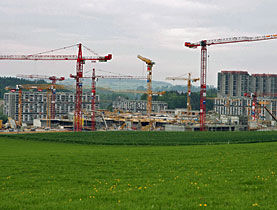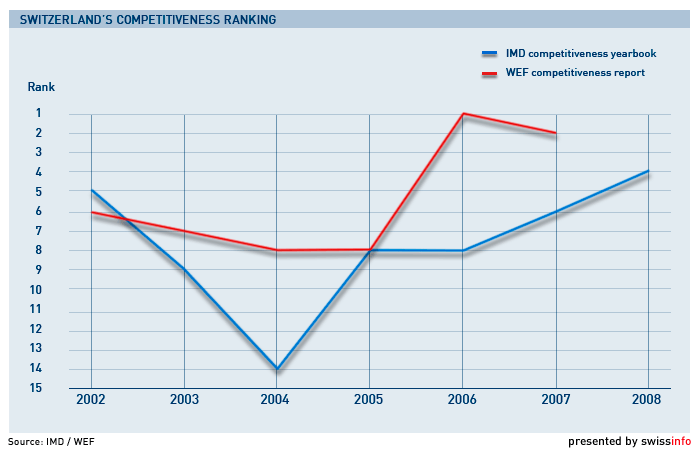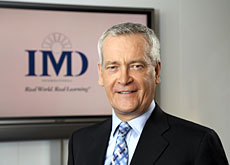Competitive Switzerland climbs world ladder

Strong economic growth, low unemployment and a large current account surplus have landed Switzerland near the top of the world's most competitive countries.
The World Competitiveness Yearbook, released on Thursday by the Lausanne-based business school IMD, rates Switzerland first in Europe and fourth in the world – behind the United States, Singapore and Hong Kong.
The ranking is an improvement over last year, when Switzerland placed sixth. A competitiveness study released by the World Economic Forum in late 2007 ranked Switzerland second.
Switzerland was among the global leaders in the areas of economic growth, infrastructure and taxation, the report found.
Its gross domestic product (GDP) growth was particularly impressive: at 3.1 per cent it was well above that of the euro zone countries.
Reto Föllmi, a professor of macroeconomics at Bern University, said the influx of highly qualified migrant workers had helped Switzerland achieve this result.
Enterprises benefited from the country’s favourable tax conditions, while the country’s infrastructure and health and education systems were other assets.
Exploiting advantages
Apart from its established financial services and manufacturing sectors, Switzerland is well poised to participate in the development of emerging economies, according to Stéphane Garelli, director of the business school’s World Competitiveness Center.
Switzerland brings “a lot of management skills, not only in terms of competence but also in international experience” he told swissinfo. But to remain competitive, the country must exploit its comparative advantages.
Garelli cited the potential to cooperate with emerging enterprises in Asia, Latin America and the Persian Gulf region.
Switzerland’s 7.53 million residents benefit from strong traditional economic indicators including a high GDP per capita and competitive current account surplus. A strong heritage of affluence also produces an impact.
“One of the great stories about Switzerland is that it is a country that has accumulated wealth during the past 100 years,” said Garelli, who is also a professor at IMD and at Lausanne University.
“So there is a long history of not only competitiveness but of wealth creation in Switzerland.” He says that even moderate but consistent economic growth adds up for time.
“At the end of the day, it makes up quite a bit of wealth,” he said. However, the historical advantage of being rich may also serve as a double-edged sword, Garelli warns.
“There is a tendency to rest on your laurels or to believe that you have achieved enough,” he said. In other words, nations that have attained a certain level of prosperity start to think about other things, such as working less.
That has very tangible implications and is exactly the position Switzerland found itself in during the 1990s, when it was rich but uncompetitive.
Work, wealth and infrastructure
While emerging economies had adopted the “work hard, get rich” mantra of the previous generations of Europeans and Americans, Switzerland, which saw itself as having it made, lagged.
While it has rebounded and boasts one of the strongest economies in Europe, the small Alpine country will continue to face pressure from emerging economies, both large and small. Singapore – which declared its independence as recently as 1963 – is already richer and more competitive than Switzerland.
Anne-France Borgeaud Pierazzi, an economist at the World Competitiveness Center, says that Switzerland is presently “stable and predictable”; nevertheless policymakers ought to seriously consider major infrastructure improvements.
“Our main challenge is to continue to invest in the infrastructure – not just economic infrastructure but social infrastructure,” she told swissinfo.
Garelli agrees. He says that to remain competitive, Switzerland must make a “massive” investment in public infrastructure, but is careful to point to the social part of the competitiveness survey. He calls it “economic growth plus something else”.
The “somethings” include quality-of-life, security of private property, sustainable development and the environment. They are among 331 criteria – over 100 of which are opinion data – measured as part of the 55-country study.
Garelli says IMD’s competitiveness research takes a “wide angle approach to economics”. It also considers subjective elements and unifies them into one theory.
IMD’s annual global competitiveness study is now in its 20th year.
swissinfo, Justin Häne with agencies
IMD is one of the world’s leading graduate business schools.
The eight-member IMD World Competitiveness Center was founded in 1989 by Professor Stéphane Garelli.
Garelli calls the study of competitiveness the “most efficient tool in modern management”.
The Center describes the competitiveness as “the ability of to create and maintain an environment that sustains more value creation for its enterprises and more prosperity for its people”.
The IMD World Competitiveness Yearbook (WCY) analyses and ranks 55 countries using 331 criteria.
Two-thirds of the data are hard statistics and one-third are opinion.
Information is collected from governments the World Bank, United Nations, the World Trade Organization and partner organizations from around the world.
United States
Singapore
Hong Kong
Switzerland
Luxembourg
Denmark
Australia
Canada
Sweden
Netherlands


In compliance with the JTI standards
More: SWI swissinfo.ch certified by the Journalism Trust Initiative



You can find an overview of ongoing debates with our journalists here. Please join us!
If you want to start a conversation about a topic raised in this article or want to report factual errors, email us at english@swissinfo.ch.